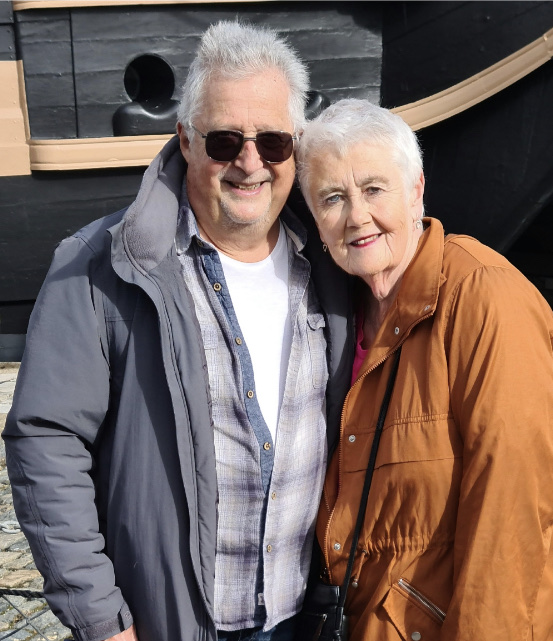Thursday 17 April 2025

Image from our men's support group in Nottingham
Men with cancer are still less likely to seek support despite making up a higher proportion of cancer diagnoses in the UK*, according to annual data published by Maggie's.
Men make up only 36% of visits to our centres, which provide free practical and emotional support for people affected by cancer.
Despite celebrities like Sir Chris Hoy and the late Formula One ace, Eddie Jordan, speaking openly about their own cancer diagnoses and encouraging other men to do the same, Maggie’s has also found that when men do reach out, they are more likely than women to be facing an incurable cancer diagnosis. This suggests that men are more reticent and waiting until they are in desperate need.
Of the men that do visit Maggie's, 37% of them have incurable cancer, compared to 31% of women.
Maggie's provides wraparound support for people with cancer, and their family and friends, at all stages of the illness, from information sessions for people beginning chemotherapy to peer support groups, wellbeing workshops and a 'Where Now?' course to help people adjust to life after treatment.
In 2024, we supported 327,405 visits across its 24 centres, the highest number on record.
Of those visits, 118,470 were made by men which, while an improvement on the previous year, remains disproportionately low.
This latest data reflects previous findings from research by Maggie's, which found that generally, men find it harder to open about their feelings and require stronger relationships with centre staff and other centre users to do so.
A recent survey** of 500 men living with cancer found:
Of the 14,288 support sessions delivered by our clinical psychologists last year, only 29% were for men, while one hundred times more women took part in our 'Where Now?' course last year, which focuses on the physical and emotional impact of life after cancer.
However, there was a significant increase in men attending gender-specific activities, with a:
Dame Laura Lee DBE, chief executive of Maggie's, said:
It is encouraging that the number of visits made by men at Maggie's centres across the UK rose by 12% last year, reflecting our efforts to get more men to access the support they need when dealing with cancer.
"However, too many men are still not seeking the support they deserve and of those that do come to Maggie's, many are only doing so when their situation becomes desperate and they are faced with an incurable diagnosis.
"We are here to support people from the moment they are diagnosed with cancer, throughout treatment and beyond, and we are urging men to reach out earlier on in their journey so Maggie's can help them, and their loved ones, navigate the emotional and practical challenges of the disease.

Marcus Grodentz, 74, from South Wales, who is married with two adult children was diagnosed with incurable prostate cancer in 2023. He said:
Those first few weeks after diagnosis were chaos and panic. I was so scared. All I wanted to do was run away and hide.
Marcus' wife encouraged him to visit Maggie's in Cardiff after receiving information about the charity from an oncologist.
I didn't really want to go, but my wife thought it might help," Marcus says.
"The first time I went to the men’s support group at Maggie’s, I brought her with me, and she waited outside. When I came out, she said 'you look completely different; I'm so glad you went.'
Currently undergoing hormone therapy to manage the disease, Marcus continues to struggle with the physical and emotional impact of having cancer.
Before all of this, I was fit and healthy," he says. Now I am constantly tired; I need the toilet all the time; I get hot flushes; mood swings; I find myself suddenly bursting into tears and I have no control over it. There are some days when I just feel really low and alone.
"The men's group at Maggie's, though, has been a huge help. Talking to the other men made me realise we all belong to a club that none of us want to be a part of, but we’re in this together.
"Men in particularly can be quite private, but our groups never feel awkward, and I feel so reassured and validated.
"Maggie’s is a fantastic charity and does an amazing job supporting not just those with cancer but their family and friends too. It has helped me so much.
Whatever kind of cancer, whatever stage you're at, Maggie's is here with you.
Our expert staff are here to listen to your concerns and find the help you need wherever you are – over the phone and online.
There are men’s support groups on offer, as well as specific cancer type groups, exercise, nutrition and one to one support with a psychologist.
If you or anyone you know has cancer, they can just come into any of the centres, there is no need for a referral or appointment.
* Cancer Research UK: 48% of cancer cases in the UK are in females, and 52% are in males.
** Maggie’s: 42% of 500 men surveyed said they had not asked for support following a cancer diagnosis, with 14% saying there were too embarrassed, 21% saying they didn’t want to talk about their feelings, and 15% saying they didn’t think the support was for men.
To find your nearest Maggie's centre, enter your postcode or town below.
Stay up to date with our news and fundraising by signing up for our newsletter.
Sign up